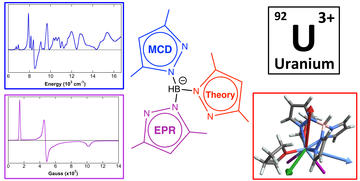
Our work in this area is motivated by the fact that detailed insight into electronic structure and bonding in heavy element chemistry remains poorly developed compared to d-block systems, despite the critical role of actinide and lanthanide compounds in environmental, non-proliferation and energy issues. Several challenges contribute to the knowledge gap that exists for the f-block elements relative to their d-block counterparts. These include the potential participation of both d- and f-orbitals in bonding, which complicates electronic structures, large spin orbit coupling (SOC) effects, as well as the prevalence of paramagnetism in these systems. Our prior work in f-element chemistry has provided critical new insight into electronic structure and bonding including the development and application of C-term MCD spectroscopy for studies of f-element complexes. In addition, we have applied advanced low temperature synthetic method combined with freeze-trapped EPR and MCD spectroscopies to study transient uranium complexes in order to further our understanding of electronic structure, bonding and reactivity in actinide chemistry. This work has focused specifically on long-standing challenges in organouranium chemistry and provided access to both novel and long sought after homoleptic aryl and alkyl complexes. Further interests include electronic structure and bonding contribution to reactivity in f-element chemistry
Selected Publications
- Wolford, N. J.; Sergentu, D. -C.; Brennessel, W. W.; Autschbach, J.; Neidig, M. L. Angew. Chem. Int. Ed. 2019, 58, 10266-10270.
- Sears, J. D.; Sergentu, D. -C.; Baker, T. M.; Brennessel, W. W.; Autschbach, J.; Neidig, M. L. Angew. Chem. Int. Ed. 2020, 59, 13586-13590.
- Wolford, N. J.; Yu, X.; Bart, S. C.; Autschbach, J.; Neidig, M. L., Dalton Trans. 2020, 49, 14401-14410.
- Gaiser, A. N..; Celis-Barros, C.; White, F. D.; Beltran-Leiva, M. J.; Sperling, J. M.; Salpage, S. R.; Poe, T. N.; Jian, T.; Wolford, N. J.; Jones, N. J.; Ritz, A. J.; Lazenby, R. A.; Gibson, J. K.; Baumbach, R. E.; Páez-Hernández, D.; Neidig, M. L.; Albrecht-Schönzart, T. E. Nat. Commun. 2021, 12, 7230.